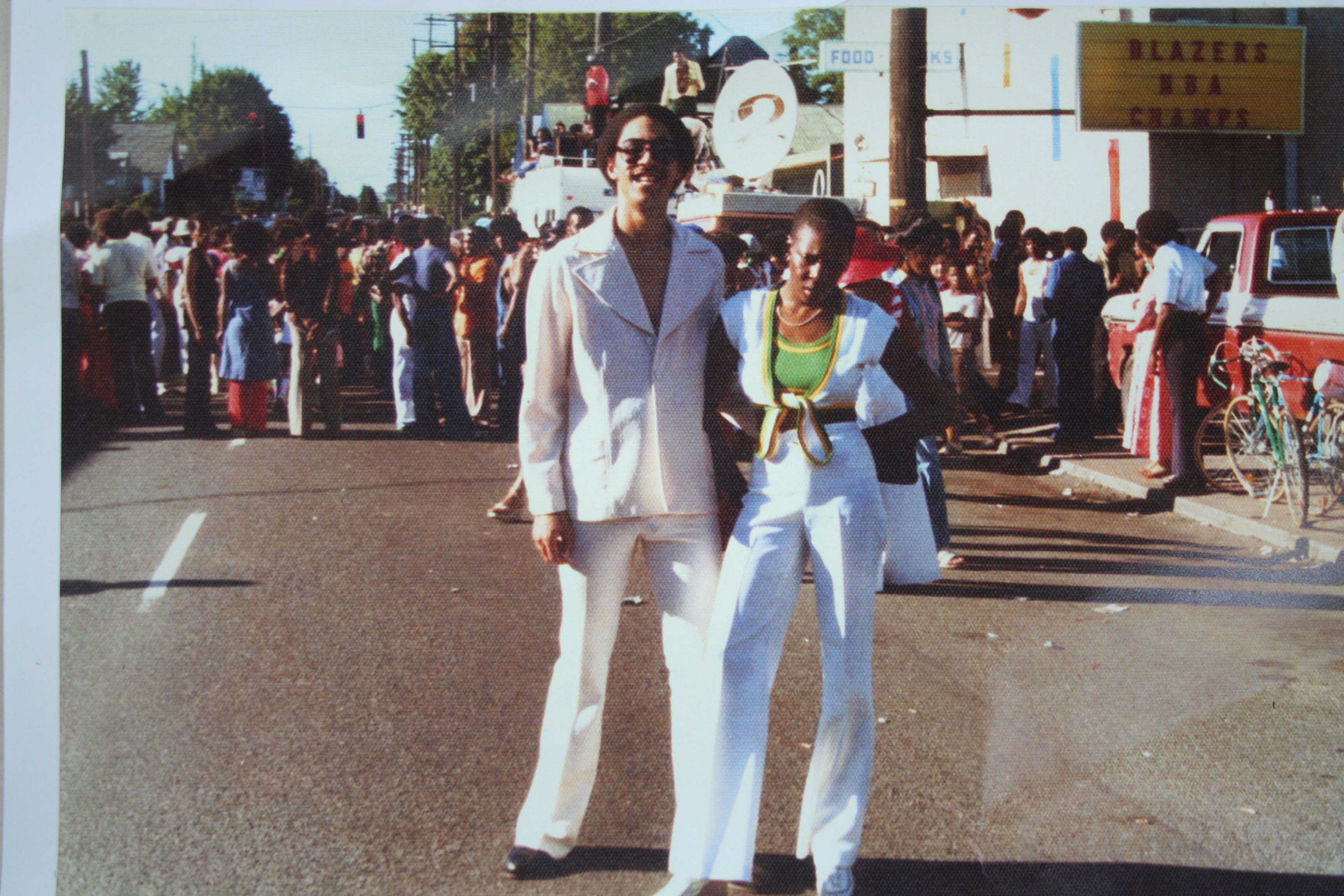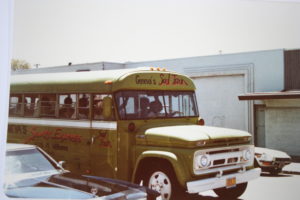“Soul Train Rollin!”: Paul K and the Greatest Get Down Block Party in Oregon History
Today, June 7, 2017 marks the 40th anniversary of the largest public gathering in Oregon history: the downtown Portland celebration one day after the Trail Blazers won the NBA championship that attracted 250,000 people.
I missed it all, by not skipping school in seventh grade at Gardiner Junior High in Oregon City. I’ve documented that sad story in my 2007 book, Red Hot and Rollin’, an anthology of essays, memoirs, primary sources, oral histories and photographs, that commemorated the championship.
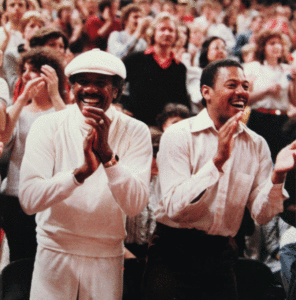 One of the oral histories was of Paul Knaals (pictured on left), a legendary figure in Portland’s African American community (still alive at 86 years old), who ran a nightclub called Geneva’s on Williams Ave. in 1977 and staged a legendary block party after the championship parade.
One of the oral histories was of Paul Knaals (pictured on left), a legendary figure in Portland’s African American community (still alive at 86 years old), who ran a nightclub called Geneva’s on Williams Ave. in 1977 and staged a legendary block party after the championship parade. 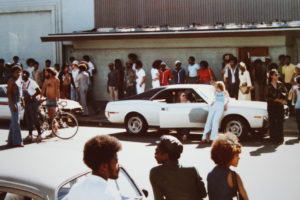 His story of his incredible connection to the team from its founding in 1970 through that championship season was a highlight of the book and important, but overlooked part of African American history from that era. Paul was incredibly gracious with me during our interview at his hair salon, in the summer of 2006. I’ll never forget when he brought out the photo album, too. I put many of these mind blowing images in the book, but unfortunately, only in black and white. Well, in honor of that magical day 40 years ago, here is a reprint of Paul’s oral history, and some of photographs. Get down on this! Spread this post please. Even if you don’t like professional sports, read this and know this story isn’t really about sports.
His story of his incredible connection to the team from its founding in 1970 through that championship season was a highlight of the book and important, but overlooked part of African American history from that era. Paul was incredibly gracious with me during our interview at his hair salon, in the summer of 2006. I’ll never forget when he brought out the photo album, too. I put many of these mind blowing images in the book, but unfortunately, only in black and white. Well, in honor of that magical day 40 years ago, here is a reprint of Paul’s oral history, and some of photographs. Get down on this! Spread this post please. Even if you don’t like professional sports, read this and know this story isn’t really about sports.
Tickets
I bought my season tickets when drafted Walton in ’74 but before that I went to the games for free. When the team started in ’70, I went to (General Manager) Harry Glickman and says, ‘I run a club called Geneva’s and if you give me four tickets for every game I’ll bring some people to the game, every game. Get them interested. I could bring different people to the game and introduce them to the team.’ So he gave me four tickets. The seats were empty back then so why not?
In ‘72 he cut it to two. In ‘73 he gave me a press pass so I would sit down on the floor with the regular press guys, and bring my camera. Sometimes I wouldn’t even have film in the camera! In those days I would just sit with my legs crossed and pretend I was taking pictures. It didn’t matter. I just wanted to be at the game. Then they drafted Walton and that’s when I got my season tickets, in the second row, behind the basket. I knew getting into the game was going to be tougher.
Geneva’s
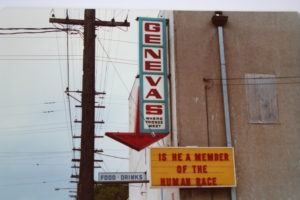 I purchased Geneva’s in 1968. My wife and I did. It was called Bess.’ We changed the name to Geneva’s. I named the club after my wife, Geneva. We went in and started our operation. We did some remodeling. Put down new carpet. It became popular, very popular, very fast. The Blazers were pretty popular with the black community in those days because the guys came around to the club. All the fellas would come around and people got to know them and that made it okay. Tanqueray really took off at this time. Tanqueary with grapfruit juice or Tanqueray straight. I went through tons and tons of the stuff that year. It was always Tanquerary. I don’t know if people just liked to say it, Tanquerary, sounds nice, don’t it?
I purchased Geneva’s in 1968. My wife and I did. It was called Bess.’ We changed the name to Geneva’s. I named the club after my wife, Geneva. We went in and started our operation. We did some remodeling. Put down new carpet. It became popular, very popular, very fast. The Blazers were pretty popular with the black community in those days because the guys came around to the club. All the fellas would come around and people got to know them and that made it okay. Tanqueray really took off at this time. Tanqueary with grapfruit juice or Tanqueray straight. I went through tons and tons of the stuff that year. It was always Tanquerary. I don’t know if people just liked to say it, Tanquerary, sounds nice, don’t it?
We had another night club called the Cotton Club. And I had another bar named Paul’s. So I had three bars on this side of town with three distinctly different clienteles. The swingers went to Cotton Club. The working man went to Paul’s. And the uppity ups came to Geneva’s. I had to have a little dress code in Geneva’s.
Bill Walton
The dress code went well until Bill Walton started coming in. He was a hippie and all of his people were hippies and they would come in dressed any old way. He started coming in the second year he was in town, the year he was hurt. That’s where he hung out, at Geneva’s. I had seen Bill at practice, been watching him after he got hurt, and I said, ‘Bill, I got a bar called Geneva’s and nobody ever heard of a bone spur. You come in there, and it will be a situation where no one will even talk about basketball. They just want to talk with you.’ Two weeks later, I was back in the office and my barmaid called. Ruby says, ‘Mr. Knaals, there’s a reeeeeeal tall red headed white guy out here…’ I knew it was Bill and I went up to him and said, ‘Hey Bill. how you doing? Welcome.’ He had put on some weight, probably 240, because he wasn’t playing. So I introduced myself again and we talked a bit. And then later that night he came back in with 8 or 10of his people, hippie people, with all their backpacks. It was they who started all this backpack stuff. Everyone got one now.
So Bill came back and everyone says, ‘How come we got to dress when they don’t have to dress?’ So I says, ‘I guess you don’t have to dress no more because this is Bill Walton’s spot now. He ended the dress code! Bill drank Budweiser. That’s why he got that gut. No hard alcohol at all. He used to ride his bicycle over to the club in the day time. The black community loved Walton. They never gave it to him about not playing like the news media and white people did.
Well, the story of the Geneva’s Soul Express is, there was a bar on 14th called the Pantry and the owner had a bus, a little one like what carries senior citizens around today, and he was taking people to the games. I called him and asked him how the bus thing works. He says, ‘It’s the greatest thing in the world. Everybody comes in the bar, has dinner first, then rides to the game, then comes back, drinks.’ So I was watching this old bus on the lot at Coast Janitorial Service and went in and says, ‘Mr. Scott, you don’t really use that bus, how much you want for it?’
‘$1500.’
‘Okay, I am going to go get the money and you have the title ready for me when I get back.’
So I got together $1000 and I came back and says, ‘Mr. Scott, I got your money.’
‘Okay, Paul Knaals, count it out!’
So I count out ten $100 bills. He says, ‘Where’s the rest?’
‘Mr. Scott, you haven’t used that bus in two years. It’s just sitting on your lot. I got the money right here.’
‘Paul Knaals, you are too much! Okay.’
I had it painted up, and put the name Geneva’s Soul Express on it. I drove it every night of a game. I left work early to go home and change, then I’d pull up to the bar in the bus and call out, ‘Soul train rollin!’ and everybody would get up and go out there. The bus carried 28 people and was always full. I would pull the bus right up in front of the Coliseum, then park. There were only a couple of buses at first doing this, then four, then five, then more. Then a guy out who owned a club out on 82nd called up and asked how it all worked. So I told him. He got a bus, painted it the same color as mine and called it the Harvest House Express. Then one night, we got on our bus after the game, and there was this white guy sitting there, backing the back, and I took off, and we got half way to Geneva’s and he says, ‘You know what driver? I think I got on the wrong bus!’ I says, ‘Too late now brother, we not stopping til we get to Geneva’s! So he came in. He had fun, man did we have fun in Geneva’s that night. And I finally says to him, ‘You need a ride? He says, ‘Yeah.” So I got my car and gave him a ride home out near 82nd. After that, every now and then, he would just come to Geneva’s and park his car and he’d ride down with us and ride back.
The Playoffs
I traveled with my wife and some other people to the away playoff games. At Denver, when David Thompson missed those two free throws to send it into overtime, we were beating on the air conditioning ducts because we were way up top and you could hear the ducts, that pounding sheet metal sound. It was all you could hear.
Once we beat LA four in a row, I knew we were rolling.
When they played the championship series, I got a call and they said we’re going to Philadelphia for the games, so we signed up to go. And we got out of Portland on Thursday morning, the game was Thursday night. We lost that game and then the next one on Sunday. And everyone there was saying, ‘You guys are from Portland right? Answer me this: Why you fly all the way here, all that way, and you lose?’ So I started making some bets, in a bar we were at. I says, ‘Hey we’re going to win the championship. I can guarantee you that!’ So I start making drink bets.
When we flew back to Portland after the second game, the Philadelphia team was on the same plane. Dr. J, Darryl Dawkins, and all the guys, and when we got in that night, Dawkins came into the club. He was only about 19 at the time but I wasn’t going to kick him out. So I says, ‘Darryl you can’t drink.’ No I know he’s going to drink but I got to tell him anyway. So I had a little guy who was my doorman, and he was about 5’ 7,” kind of stocky, and I says, ‘Tim, I want him (Dawkins) out of the bar. He’s too young to be in here. I want him out of the bar.’
‘Which one?’
‘That guy in the corner.’
So he goes over to look at him and he comes back and says, ‘Mr. Knaals, you mean that big guy over there in the corner?’
‘Yeah, I want him out of here.’
‘I’m sorry, I’ll just have to quit my job because I can’t put him out.’
‘That’s okay Tim, that’s Darryl Dawkins and he plays for Philadelphia. I was joking.’
Dawkins tipped someone $20 that night, which was like $500. A lot of Sixers came in during the series. Even Dr. J.
The Party
The night before game six, I knew we were going to win, so I’m thinking, ‘We are going to need some barricades because I am going to barricade the street (Williams Ave)’ So I went down to seventh and Knott and they were doing some construction, and I took two barricades that weren’t going to be dangerous to anyone if missing from the construction site. I came down with the truck and loaded them up.
Everybody knew that if we won, there was going to be a party at Geneva’s. After the game, I came to the bar and the street started getting full and I put the barricades up. That was about three o’ clock? I did it myself. About 3:30 or 4, Mayor Neil Goldschmidt came by and he couldn’t get through. He was coming up to the club. And I went down and says, ‘Neil, how out doing? C’mon through.’
‘Paul, what are you doing with these barricades up here?’
‘Neil, you don’t want cars going through here. Look at all these people on the street!’
So he gets on a radio and called down and told the police to get some more barricades out here. He didn’t want anyone getting killed.
There was a party planned downtown but nobody went there. They came to my place. Then the media found out and all the television stations showed up. We opened up the street to let them come up and they got to partying and then asked us to whoop it up whenever they started filming. Everybody was screaming.
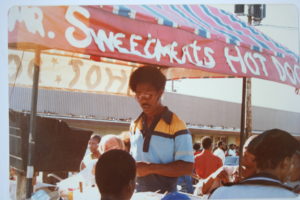 The night before I had a guy, he called himself Mr. Sweet Meats, set up for food. I says, ‘If we win the championship tomorrow, if you set up and we don’t win, I’ll pay you $25, and if we win, you’re on your own.’
The night before I had a guy, he called himself Mr. Sweet Meats, set up for food. I says, ‘If we win the championship tomorrow, if you set up and we don’t win, I’ll pay you $25, and if we win, you’re on your own.’
And we won and people were out on the street buying everything. I had Mr. Sweet Meats selling hamburgers, hot dogs and sausages. We had another stand with popcorn. One woman had cooked a roast for Sunday dinner but she just came down and cut the roast up with bread, mayonnaise and sold sandwiches right there on the street.
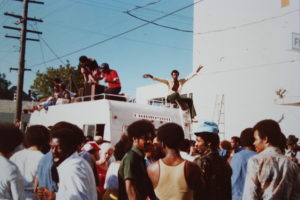 There was a church just adjacent to Geneva’s on the next block, so when church let out, they just walked right over and started partying. A friend of mine, Lloyd Allen, was into music. And he had his friend bring a RV down, and they set up some music on top of it. People were out in the street dancing the Blazermania, you know, when you put your hands over your head and spin them like Walton used to do on the court. I had a couple of go go girls too, doing the Blazermania all over. They were Miss Rip City and Miss Blazermania.
There was a church just adjacent to Geneva’s on the next block, so when church let out, they just walked right over and started partying. A friend of mine, Lloyd Allen, was into music. And he had his friend bring a RV down, and they set up some music on top of it. People were out in the street dancing the Blazermania, you know, when you put your hands over your head and spin them like Walton used to do on the court. I had a couple of go go girls too, doing the Blazermania all over. They were Miss Rip City and Miss Blazermania.
Corky Calhoun showed up first. Then Luke came. Lloyd Neal came. Later that evening, Lionel Hollins. Then Johnny Davis. Herm Gilliam. Harry Glickman came with his wife and daughter, who was six years old. Coach McKinney and his wife came.
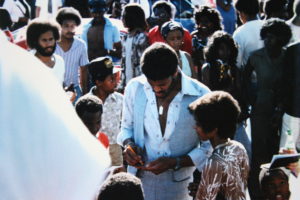 There was more action in the street but it was happening in the bar too. We couldn’t serve fast enough. I was behind the bar and couldn’t keep up with the drinks. And we were able to sell every beer that we had cold or warm. We was giving them a hot beer with a glass of ice. It was the only time my wife ever worked at the bar in all the years we owned it.
There was more action in the street but it was happening in the bar too. We couldn’t serve fast enough. I was behind the bar and couldn’t keep up with the drinks. And we were able to sell every beer that we had cold or warm. We was giving them a hot beer with a glass of ice. It was the only time my wife ever worked at the bar in all the years we owned it.
We had no trouble at all. All I was doing was every once and awhile I would take the money in a sack and put it into the safe. I took it out about six or seven times. We made about $6500 that day. What a take. Drinks were 75 cents or a dollar. We were rolling. I mean we were selling the beers distributors had given us that nobody wanted, mostly ales, and we got rid of every old bottle of ale from the basement. Everything was gone. What a day.
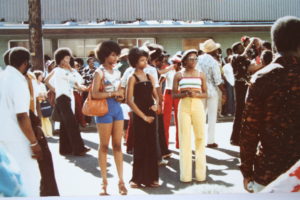 We had a couple of guys park their motorcycles on Williams Ave. and they just walked on through. The Gypsy Jokers were right down the street, that horrendous gang back then that traveled around. I never did find out if these guys were Jokers but they looked like it. They came in and started jamming just like everybody else. The title put Portland on the map. No one had ever heard of us before. The party here went into the early morning.
We had a couple of guys park their motorcycles on Williams Ave. and they just walked on through. The Gypsy Jokers were right down the street, that horrendous gang back then that traveled around. I never did find out if these guys were Jokers but they looked like it. They came in and started jamming just like everybody else. The title put Portland on the map. No one had ever heard of us before. The party here went into the early morning.
Permit? What permit?

